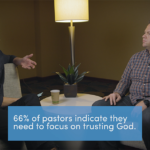
God calls the church to meet the needs of its people and to serve the community at large, even—perhaps especially—as these needs change.
By Jamie Sumner
My son Charlie is in first grade. He attends a public school and desperately misses his friends and his teachers as we shelter in place during this COVID-19 crisis.
Charlie also has cerebral palsy and uses a wheelchair to move and a speaking device to communicate. And so this seclusion adds a second layer to our isolation.
He’s not getting his speech, physical, or occupational therapy. He’s not riding his horse in equine therapy.
His usual people, places, and activities have been removed, and by proxy, so has his connection to the community which we, as his parents, have worked so hard to establish.
This is most apparent in church.
We’re blessed to be part of a church that designed a special needs program around Charlie and a few of his friends who have additional needs.
Charlie has a “buddy” with him in Sunday School who helps him do the crafts, follow along in the lesson, and eat snack.
Our church also hosts a special Easter egg hunt with separate start times for children with special needs as well as a wheelchair friendly hunt where the eggs are tied to balloons for easier reach.
Charlie also attends “special Saturday” once a month where volunteers sing songs, share Bible stories, and run him around the bases in kickball so that my husband and I can have a few morning hours to ourselves to drink coffee, eat bagels, and reconnect.
None of this is happening right now.
God calls the church to meet the needs of its people and to serve the community at large, even—and I would say, especially—as these needs change. Here are a few suggestions to help your church care for those with special needs during this time of crisis:
1. Go virtual.
Like most churches, ours has gone digital with live services on Sunday and Wednesday nights.
The Sunday School teachers say hello to all the kids before the service and give a special word of encouragement to the special needs community.
The highlight of Charlie’s week is seeing his favorite people on the television.
2. Send personal emails.
It means more than I can say to receive an email from someone in the church who’s personally checking in on me.
It’s visible proof that someone is out there thinking of us and asking each week: “How can I pray for you?”
My answers are often specific and deeply personal: We need bedtime to get easier. We need Amazon to deliver the diapers that are out-of-stock. I need a good night’s sleep and to figure out five more meals I can make from what’s left in my pantry.
I don’t expect this person to solve all of these problems. It’s enough to share and be heard.
3. Offer drive-by deliveries.
Our church has a long-established grocery delivery service for those in need.
Since the COVID-19 outbreak, they have extended this service to those of us church members who cannot get out as easily due to immunocompromised family members.
This has been such a blessing. They have dropped off food and cleaning supplies tucked with handwritten notes wishing us well and letting us know they’re praying for us.
This is both practical and personal as it cares for our physical needs as well as our emotional and spiritual ones.
4. Don’t be afraid of Zoom.
Sometimes virtual church isn’t enough. Like a phone call, you need the interaction to go both ways.
On Wednesday nights, our church offers Zoom chats so Charlie can connect with his “buddy,” his Sunday School teachers, and some of his Sunday School classmates.
It’s been wonderful to see everyone together in the “virtual classroom” and a great reminder that we aren’t as isolated as we sometimes feel.
5. Offer online resources.
The possibilities here are endless—from Sunday School lesson plans, to the lyrics to the songs you will sing in virtual church, to nightly devotionals.
Having special needs can often make you feel excluded from the activities of the rest of the world, but these online offerings, in whatever form they take, can make church feel more inclusive than ever before.
These are activities we can all do together no matter the age or ability.
The best advice I can give
Perhaps the biggest advice I can extend to any church as it works to meet the special needs of its congregation is this: Don’t be afraid to take a risk.
None of this is normal. Nothing is an established success or has been survey-tested for guaranteed approval.
We’re all in unfamiliar territory. There can be freedom in that. God will use you and your church if you’re willing to be brave in new ways.
Continue to reach out through the means God opens up for you.
Make each initiative personal if you can—write notes, make calls, chat online, drop off food, ask for prayer requests. Keep connecting and let God carry the weight of “success.”













